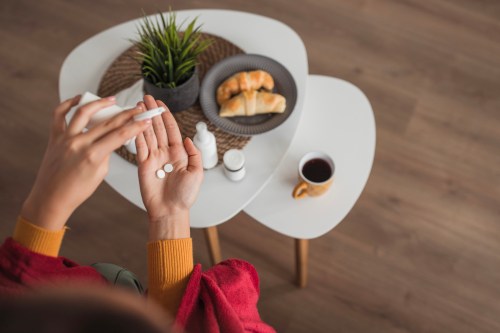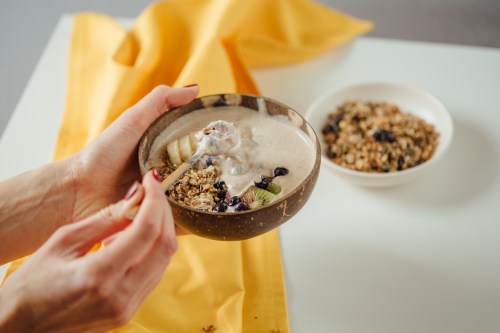Listen Up, Coffee Lovers: Don’t Mix These 8 Meds with Caffeine
And some of these are available over-the-counter, too.

If the first thing you do when you wake up is make a cup of coffee, it's good to know that this morning habit may actually benefit your health. Coffee is a rich source of antioxidants and essential nutrients, and can give you a much-needed jolt of energy to help you feel awake and alert. Not to mention, it might even boost your mood.
Experts in This Article
registered dietitian based in Palm Beach Gardens, Florida
an assistant professor of medicine at the Icahn School of Medicine at Mount Sinai
cardiologist with Manhattan Cardiology
But as joy-bringing as coffee is, it’s not right for everyone, at least not all the time. Thanks to coffee’s high caffeine content—a 12-ounce brewed cup might contain anywhere from 113 to 247 milligrams of caffeine, according to the U.S. Food & Drug Administration (FDA)—can negatively interact with a number of common medications. And some of these meds you might even be picking up over-the-counter (OTC) without realizing the possible drug interactions they can have with caffeine.
So let's talk about which medications just don't pair well with coffee that you may want to avoid, especially if you're consuming multiple cups of joe each day.
8 medications to not mix with coffee
First things first: Whenever you’re prescribed a new medication, ask your healthcare provider if there are any contraindications you should know about. (FYI, this is just medical-speak for foods, drinks, or other drugs to avoid when you’re on a particular medication.)
“My recommendation is always to cross-check with a physician for the potential of drug-nutrient interactions with coffee, or caffeine in general,” says Lena Bakovic, MS, RDN, a registered dietitian based in Palm Beach Gardens, Florida. Or, if purchasing a new OTC med for the first time, consulting your pharmacist is a good idea.
If you’re taking any of the medications below, talk to your healthcare provider about how they might interact with coffee and what precautions you should take. (And of course, even if the meds you’re on aren’t listed below, it’s always a good idea to review them with your healthcare provider just to be safe!)
1. Anticoagulants such as Coumadin (warfarin) or heparin
Anticoagulants are a type of blood thinner, meaning they prevent your blood from clotting too easily. You may have been prescribed blood thinners if your healthcare provider believes you’re at higher risk of developing blood clots—which can happen if you have underlying health conditions like heart and blood vessel disease, an abnormal heart rhythm, or any kind of congenital heart defect.
When you’re taking anticoagulants, though, it’s best to be mindful of your coffee intake. “Caffeine can increase the concentration of blood-thinning medication in the bloodstream, enhancing its effects and increasing the risk for bleeding,” explains Heather Viola, DO, an assistant professor of medicine at the Icahn School of Medicine at Mount Sinai.
2. Certain antidepressants, such as Marplan (isocarboxazid), Nardil (phenelzine), and Parnate (tranylcypromine)
Not all antidepressants interact with caffeine, but monoamine oxidase inhibitors (or MAOIs for short) have the potential to.1 MAOIs manage depression symptoms with the help of neurotransmitters, aka chemical messengers that send messages between your brain cells. “This class of antidepressants may have drug-nutrient interactions with caffeine,” says Bakovic, adding that there have been reports of increased blood pressure in some cases.
What’s more, this can make these medications less effective over time. “Drinking large amounts of coffee when taking antidepressants or antipsychotics may reduce the amount of medication your body absorbs,” Dr. Viola explains.
3. ADHD medications such as Adderall (amphetamine and dextroamphetamine), Vyvanse (lisdexamfetamine), and Ritalin (methylphenidate)
Caffeine is a type of stimulant, which is why it makes you feel more alert.2 But stimulant medications, which are frequently prescribed for attention-deficit/hyperactivity disorder (ADHD), have a similar effect on your body—and taking these meds while also consuming lots of caffeine can lead to negative side effects.
“Combining stimulants may cause an unsafe increase in heart rate, blood pressure, and symptoms of palpitations,” says Mary Greene, MD, a cardiologist with Manhattan Cardiology in New York City. Taken together, both of these stimulants can also make you feel extra anxious, Bakovic adds.
4. Thyroid medications such as Synthroid (levothyroxine)
People with thyroid conditions such as hypothyroidism (underactive thyroid) may be prescribed a medication called levothyroxine, which replaces the thyroid hormone that your body isn't producing enough of. Coffee may reduce this medication’s effectiveness, though. “It lowers your body’s ability to absorb thyroid medication by half,” Dr. Viola says. (One study also suggests that tea may have a similar effect on levothyroxine.)3
5. Some asthma drugs, such as bronchodilators
If you have asthma, your healthcare provider might prescribe a bronchodilator, a type of medication that relaxes your airways and makes breathing easier.4 But if you’re drinking a lot of caffeine while also taking these medications, you might be more likely to experience side effects.
“Bronchodilators can cause a racing heart, restlessness, headache, and irritability,” Dr. Viola notes. “Too much caffeine can worsen these side effects and reduce the amount of medication your airways can absorb.”
6. Some blood pressure medications, such as Lopressor (metoprolol)
Metoprolol helps relax your blood vessels, which slows down your heart rate to reduce strain on your heart. You might be taking metoprolol if you have high blood pressure, or your healthcare provider may have prescribed it along with other medications after experiencing a heart attack. But drinking coffee while also taking blood pressure medications may cause your body to absorb less of the drug, Dr. Viola explains.
7. Diabetes medications
Caffeine can also interfere with medications that help manage blood sugar levels in people with type 2 diabetes, according to the American Diabetes Association. “Drinking a lot of caffeine could raise your levels of blood sugar and insulin, the hormone that regulates blood sugar,” Dr. Viola explains. A 2004 brief report also noted that studies have shown that caffeine might impair glucose metabolism in people living with diabetes, which could make the condition more difficult to manage.5
8. Some allergy medications, such as Alavert-D and Claritin-D (pseudoephedrine)
You might not think to talk to your healthcare provider about meds you pick up at the pharmacy, but some drugs, like allergy medications, also don’t mix well with coffee. “If you have allergies or are experiencing a cold, check to make sure the medication you are taking doesn’t include pseudoephedrine,” says Dr. Viola. These are usually sold as tablets that pair an antihistamine with a decongestant to manage allergy symptoms like sneezing and a runny nose.
Combining pseudoephedrine with coffee can increase your chances of developing side effects, Dr. Viola adds, which might include restlessness, heart palpitations, and trouble sleeping.
Other things to consider while taking meds
Your healthcare provider is going to be your MVP when it comes to advising you on how much (if any) coffee you can continue drinking with the medications above. (It may vary from med to med, for example, and will also depend on what other medications you might be taking and what health conditions you live with.) But to minimize the effects of caffeine on your body, your healthcare provider might recommend the following strategies:
- Stick to just one cup of coffee: “Keep in mind, heavy coffee drinkers—those who down more than three cups a day—are more likely to experience drug interactions,” Dr. Viola points out. But most people won't have any serious side effects if they consume less than 300 milligrams of caffeine a day, she adds.
- Choose low- or no-caffeine options: Switching to decaffeinated coffee or opting for a cup of tea instead will help reduce your caffeine intake (12 ounces of black tea has 71 milligrams of caffeine, compared to coffee’s 247). Brewing tea for a shorter amount of time will also reduce the amount of caffeine content, according to Dr. Viola, while herbal teas tend to contain less caffeine than black, according to the FDA.
- Skip sodas: If you’ve become accustomed to the energy jolt from coffee, try not to substitute it for soda or energy drinks. “They will have the same effect” on your medications, Dr. Viola warns—plus, they’re loaded with sugar and artificial sweeteners.
- Delay your coffee: Ask your healthcare provider if you can still have your daily cup of coffee later in the day, especially if you’ve been advised to take your medication first thing in the morning.
- Up your water intake: To really avoid any possible drug reactions, good-old H2O is always your best bet. “Water truly is an optimal beverage for almost everyone,” Bakovic says. “And to top it off, it is a sugar-free beverage benefitting several bodily functions, which include digestive health and the obvious: hydration.”
When to check in with your provider
Whenever you start taking a new medication, your first must-do is to check in with your healthcare provider about any possible interactions, as they can offer guidance specific to the medication you’re on. For instance, they might suggest limiting the amount of caffeine you consume, substituting coffee for another drink, or indulging in your daily cup at a certain time of day.
Then, it’s always worth a check-in if:
- You’re experiencing unpleasant symptoms after starting a new medication. If you’ve been drinking a lot of coffee and it’s interacting with a medication, you might notice heightened restlessness, a racing heart, headache, or irritability, as a few examples, Dr. Viola says.
- You’re experiencing new or unusual side effects at any time. Even if you’ve been taking a particular medication for months or years, let your healthcare provider know if anything at all suddenly seems different. Then, think back to your recent coffee consumption (e.g., have you been downing more cups lately?), and cut back if necessary.
- It feels like your medication isn’t doing its job. You probably know how you should feel on your medication, so pay attention if something feels off. “If the medication just does not seem to be working as well, this is another example to consult your provider ASAP,” Dr. Viola says.
- You notice any red-flag symptoms. Although rare, seek emergency care if you experience any more serious side effects. According to Dr. Greene, this might include dizziness, lightheadedness, chest pain, shortness of breath, fainting, or vomiting.
And above all else, pay attention to what’s going on in your body, regardless of how much coffee you’ve been drinking. “If you notice something out of the norm or side effects you haven’t had before, that is an absolute indication to consult with a provider as soon as possible,” Dr. Viola emphasizes.
- Laban, Tahrier Sub, and Abdolreza Saadabadi. “Monoamine Oxidase Inhibitors (MAOI).” StatPearls - NCBI Bookshelf, 17 July 2023, www.ncbi.nlm.nih.gov/books/NBK539848. ↩︎
- Evans, Justin, et al. “Caffeine.” StatPearls - NCBI Bookshelf, 29 May 2024, www.ncbi.nlm.nih.gov/books/NBK519490. ↩︎
- Lai, Ying-Wen, and Shih-Ming Huang. “Tea Consumption Affects the Absorption of Levothyroxine.” Frontiers in Endocrinology, vol. 13, Sept. 2022, https://doi.org/10.3389/fendo.2022.943775. ↩︎
- Almadhoun, Khaled, and Sandeep Sharma. “Bronchodilators.” StatPearls - NCBI Bookshelf, 28 Apr. 2023, www.ncbi.nlm.nih.gov/books/NBK519028. ↩︎
- Lane, James D., et al. “Caffeine Impairs Glucose Metabolism in Type 2 Diabetes.” Diabetes Care, vol. 27, no. 8, Aug. 2004, pp. 2047–48. https://doi.org/10.2337/diacare.27.8.2047. ↩︎










